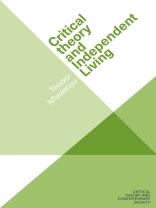Critical theory and Independent Living explores intersections between contemporary critical theory and disabled people’s struggle for self-determination. The book highlights the affinities between the Independent Living movement and studies of epistemic injustice, biopower, and psychopower. It discusses in depth the activists’ critical engagement with welfare-state paternalism, neoliberal marketisation, and familialism. This helps develop a pioneering comparison between various welfare regimes grounded in Independent Living advocacy. The book draws on the activism of disabled people from the European Network on Independent Living (ENIL) by developing case studies of the ENIL’s campaigning for deinstitutionalisation and personal assistance. It is argued that this work helps rethink independence as a form of interdependence, and that this reframing is pivotal for critical theorising in the twenty-first century.
Daftar Isi
Introduction
1 Disability and independence
2 The European Network on Independent Living
3 Independent Living and the state
4 Independent Living and the market
5 Independent Living and the family
6 Independent Living, deinstitutionalisation, and personal assistance
7 Independent Living and other critical positions
Conclusion
Index
Tentang Penulis
Teodor Mladenov is a Senior Lecturer in the School of Humanities, Social Sciences and Law at the University of Dundee












